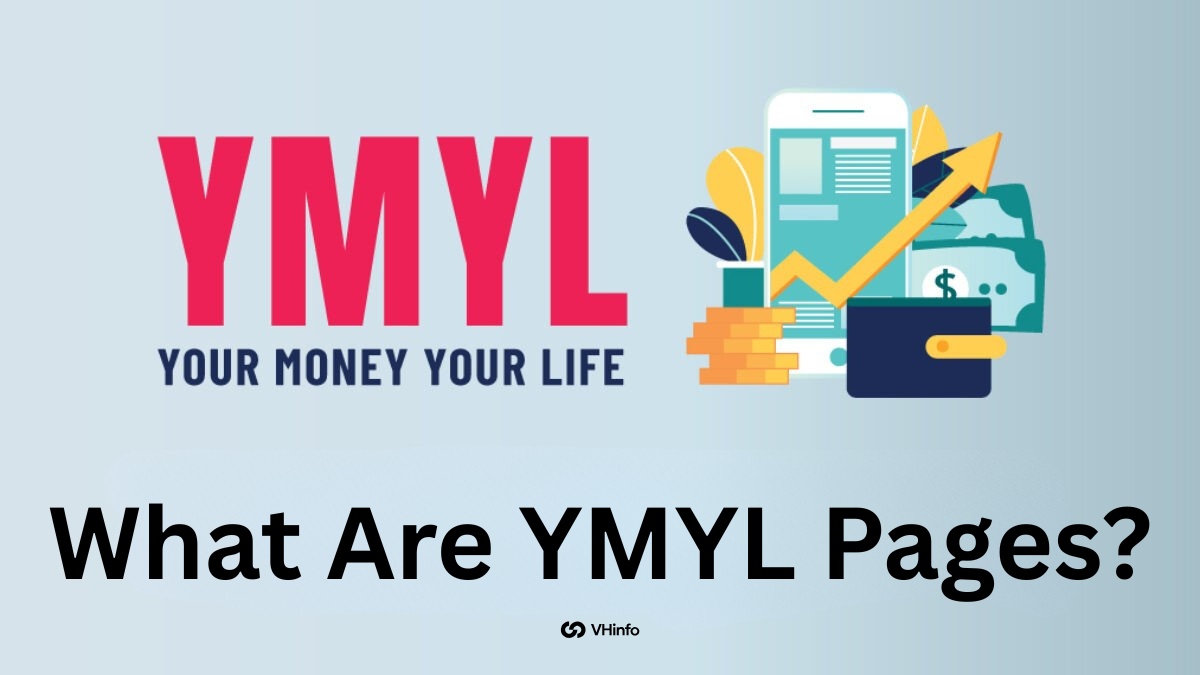If you create content for the web, you need to know about YMYL pages. YMYL stands for “Your Money or Your Life.”
These are web pages with information that could affect a person’s health, happiness, or financial stability. For any content creator or business with a website, paying attention to YMYL is not just a good idea; it is a fundamental part of a smart search engine optimization plan.
Google holds these pages to a very high standard because bad information on a YMYL page can have a direct impact on people’s lives. A weak content strategy for a YMYL topic can hurt your search rankings and, more importantly, can harm your audience. This guide explains what YMYL pages are, why they matter so much, and how you can create quality content that meets Google’s expectations and builds user trust.
What Are YMYL Pages?

YMYL pages are web pages that offer advice or information on topics that can seriously affect a person’s well-being.
Think about a piece of content that gives medical advice, financial information, or legal guidance. If the information is wrong or misleading, it could cause real problems. Because the stakes are so high, this type of content is scrutinized by Google more than any other.
Any page that asks for personal information or processes financial transactions is also considered a YMYL page.
Google’s goal is to protect users from low-quality, harmful content in its search results. Therefore, if you operate in YMYL niches, you must provide the most accurate and trustworthy information possible to earn a good spot in the search engine results.
Why Is YMYL All the More Important Now?

The focus on YMYL has grown significantly over the years.
Google’s algorithm continues to get smarter about identifying content that could cause harm, making it harder for low-quality YMYL sites to rank. For anyone involved in digital marketing, a solid approach to YMYL is necessary for long-term success in organic search.
Defining “Your Money Or Your Life” (YMYL)
The term “Your Money or Your Life” shows what is at risk. These topics can shape big choices in life.
For instance, if someone gets bad money advice, they might lose their savings. This can hurt their money safety. Wrong health facts could keep a person from getting good help. This may cause bad health problems.
Google wants people to find good and true answers when they search for these hard topics. They want the sources to be trusted. The value of YMYL content can make lives better or worse. Google works hard to show safe and helpful pages because this is very important to them.
The History and Evolution of YMYL in Google’s Guidelines
The concept of YMYL was first detailed in Google’s Search Quality Evaluator Guidelines.
These guidelines are used by human quality raters who review websites and provide feedback to help improve Google’s algorithm. The introduction of YMYL was a clear signal that Google was raising the bar for certain types of content.
Over time, through various algorithm updates, Google has refined its ability to automatically assess the quality of a YMYL page. These updates make it very difficult for websites that lack expertise or trustworthiness to appear high in search rankings for a YMYL topic.
Google’s guidelines now put an even greater emphasis on the real-world harm that low-quality content can cause.
Why Google Places A High Emphasis on YMYL Content?
Google’s main goal is to provide value to its users. If users find harmful or incorrect information through a Google search, they will lose trust in the search engine. This is especially true for YMYL topics where the stakes are highest.
By holding YMYL content to the strictest standards, Google protects its users and its own reputation.
When quality raters evaluate a YMYL page, they are asked to think about the potential for harm. A page with inaccurate medical advice is considered very low quality, no matter how well-written it seems. Google prioritizes content from subject matter experts and authoritative sites to ensure users receive safe and accurate information. This protects both the user and their financial stability or health.
Identifying Key Categories of YMYL Pages

To succeed with your content marketing, you first need to know if you are creating YMYL content. The Search Quality Rater Guidelines outline several key YMYL categories. If your website touches on any of these subjects, you need to follow YMYL best practices.
Health, Fitness, and Medical Information
This is one of the most obvious YMYL categories. It includes any content that provides medical advice, discusses diseases, or offers information on drugs or mental health. For example, a blog post about managing a chronic illness or a page describing the side effects of a medication is a YMYL page. Users rely on this medical information to make important health decisions. Sites like the Mayo Clinic are often cited as examples of high-quality YMYL sites because they use subject matter experts to create and review their content.
Financial Advice and News
Content that offers financial information or advice is firmly in the YMYL camp. This includes topics like retirement planning, investing, taxes, loans, and insurance. Bad financial advice can ruin a person’s financial security. Therefore, Google wants to see that content about financial planning comes from reputable sources and qualified professionals. News articles about the economy also fall into this category.
Legal and Governmental Information
Pages that provide legal advice or information about laws, government programs, or social services are also YMYL.
Getting legal issues wrong can have severe consequences, so this information must be accurate. This includes topics like voting, creating a will, or applying for government benefits. Users need to trust that they are getting correct legal information to make informed choices.
News, Current Events, and Public Interest Topics
News articles and information about current events are considered YMYL because they inform the public about important happenings in the world. Misinformation on topics like politics, science, or technology can cause confusion and harm. A news organization must have a positive reputation for factual reporting to be considered a high-quality source. Authoritative sources are key for these topics.
Shopping and E-commerce Transactions
Any page where you can spend money is a YMYL page.
This includes product pages, checkout pages, and any e-commerce function that asks for credit card details or personal information. Users need to trust that their information is secure and that the transaction will be handled properly.
Poor website security on a shopping site can lead to fraud and financial loss.
Information on Specific Groups of People
Content that focuses on groups of people based on race, religion, gender, nationality, sexual orientation, or other characteristics is also a YMYL topic. This type of content is sensitive, and spreading stereotypes or hate can cause significant harm.
This is a very important part of YMYL that shows how broad the category is.
The Important Role of E-E-A-T For YMYL Pages

To evaluate YMYL pages, Google uses a framework called E-E-A-T.
E-E-A-T stands for Experience, Expertise, Authoritativeness, and Trustworthiness. For any YMYL page to perform well in Google Search, it must demonstrate a high level of E-E-A-T. This is a very important ranking factor.
Demonstrating Experience: First-Hand Knowledge
The first “E” stands for Experience. This refers to having first-hand, real-life experience with the subject matter.
For example, a review of a product written by someone who has actually used it shows Experience. A person sharing their personal journey with a medical condition also demonstrates Experience.
This makes the piece of content more relatable and authentic, which builds user trust.
Proving Expertise: Credentials and Qualifications
The second “E” stands for Expertise. This is about having formal knowledge and qualifications on a topic. For YMYL content like medical or financial advice, Expertise is extremely important. You need to show that your content is written or reviewed by subject matter experts.
A doctor writing medical advice or a certified financial planner discussing retirement planning are examples of Expertise.
Building Authoritativeness: Becoming A Go-To Source
“A” stands for Authoritativeness. This is about your website’s reputation as a go-to source of information on a particular subject.
One of the best ways to build authority is through link building. When other authoritative sites link to your content, they are giving you a vote of confidence. These external links tell the search engine that you are a reliable source.
At VH Info, we specialize in helping businesses build these high-quality backlinks to establish their authority in competitive YMYL niches.
Establishing Trustworthiness: Accuracy, Safety, and Transparency
“T” stands for Trustworthiness. Trust is the most important part of E-E-A-T, especially for YMYL pages.
Trustworthy site provides accurate information, cites credible sources, and is transparent about who is behind the content. It also means having a secure website (HTTPS) and clear contact information.
All of these elements act as trust signals that tell both users and Google that your site is legitimate.
Best Practices For Optimizing Your YMYL Pages

If your site has YMYL pages, you need a content strategy that prioritizes E-E-A-T. Following these best practices will help improve your page quality and search rankings. This is a key part of any serious marketing strategy for YMYL sites.
- Creating Comprehensive and Factually Accurate Content: The foundation of a good YMYL page is quality content. Your information must be correct, detailed, and up-to-date. Double-check your facts and make sure your content answers the user’s questions completely. This is the most important step in content creation for any YMYL topic.
- Featuring Clear Author Bios and Credentials: Do not publish YMYL content anonymously. Every piece of content should have a clear author with a bio that explains their experience and expertise. If a subject matter expert wrote or reviewed the content, showcase their credentials. This directly supports the Expertise part of E-E-A-T.
- Citing Reputable and Authoritative Sources: Show your work. When you make a claim, especially about health or finance, back it up by citing reputable sources. Use external links to point to studies, official reports, and other authoritative websites. This shows that you have done your keyword research and are committed to providing accurate information.
- Securing Your Website With HTTPS: Every website, especially a YMYL site, should use HTTPS. This encrypts the data shared between the user’s browser and your website, protecting their information. A secure site is a basic trust signal that no modern website should ignore.
- Maintaining A Positive Online Reputation and Reviews: Google looks at more than just your website. It also considers what other people are saying about your brand online. A positive reputation, good reviews, and mentions on social media can all contribute to your perceived authoritativeness and trustworthiness. Manage your online presence to build a positive reputation.
- Making Contact and Support Information Easily Accessible: Users need to know who is behind the website. Your site should have an “About Us” page and easily accessible contact information, including a physical address and phone number if possible. This transparency is a powerful trust signal and shows you stand behind your content.
Common Pitfalls to Avoid With YMYL Content

Many YMYL sites fail because they make simple mistakes. Avoiding these common pitfalls is essential for building a trustworthy website that ranks well in organic search.
- Lack of Clear Expertise Or Authorship: One of the biggest red flags for a YMYL page is the absence of a clear author. If Google’s quality raters cannot tell who wrote the content or if that person is qualified, the page will be rated as low quality. Always be transparent about authorship.
- Providing Misleading Or Outdated Information: YMYL information must be current and correct. Publishing outdated medical advice or incorrect financial information is dangerous and will quickly destroy your site’s credibility. Regularly review and update your YMYL content to ensure it remains accurate.
- Poor Website Security and User Experience: A website that is not secure, loads slowly, or is difficult to use on mobile devices creates a poor user experience. This signals to Google that the site may not be trustworthy. Website security and a good user experience are table stakes for any YMYL page.
- Insufficient Contact and About Us Details: If a user cannot easily find out who you are or how to contact you, they will not trust you. A lack of contact information makes a website seem shady and untrustworthy. Be open and transparent to build user trust.
FAQ’s:
What is the Difference Between YMYL and E-E-A-T?
YMYL and E-E-A-T are related but different concepts. YMYL refers to the type of content—topics that can affect a person’s money or life. E-E-A-T is the framework Google uses to measure the quality of that content. A YMYL page needs high E-E-A-T to rank well.
How Can I Determine If My Website Has YMYL Pages?
Review the main YMYL categories: health, finance, legal, news, shopping, and information on groups of people. Ask yourself if any of your content could hurt a person’s health, happiness, safety, or financial stability. If the answer is yes, you have examples of YMYL pages.
Can A New Website Rank For YMYL-Related Keywords?
It is challenging for a new website to rank for YMYL keywords because it takes time to build authority and trust. However, it is not impossible. A new site must focus on demonstrating high E-E-A-T from the very beginning.
An effective marketing strategy that combines excellent quality content with a strategic link-building campaign is critical. Gaining backlinks from reputable websites shows Google that others in your field trust you, helping you build a positive reputation faster.
How Often Does Google Update Its Criteria For YMYL Content?
Google is constantly working to improve its search results.
This means Google’s algorithm is always changing, and there are frequent algorithm updates. The Search Quality Evaluator Guidelines, which detail the criteria for YMYL and E-E-A-T, are also updated periodically to reflect Google’s latest thinking on page quality.
Conclusion
YMYL pages carry a heavy responsibility.
The information on these pages can have a meaningful effect on people’s lives, and that is why Google holds them to the highest standards. By focusing on creating trustworthy, accurate, and expert-driven content, you can meet Google’s expectations and build a loyal audience.
A successful approach to YMYL involves more than just good writing; it requires a deep commitment to E-E-A-T. By featuring expert authors, citing authoritative sources, and being transparent, you send strong trust signals to both your users and search engines. For any brand operating in a YMYL niche, making E-E-A-T a core part of your digital marketing and SEO services is the only path to sustainable success.



